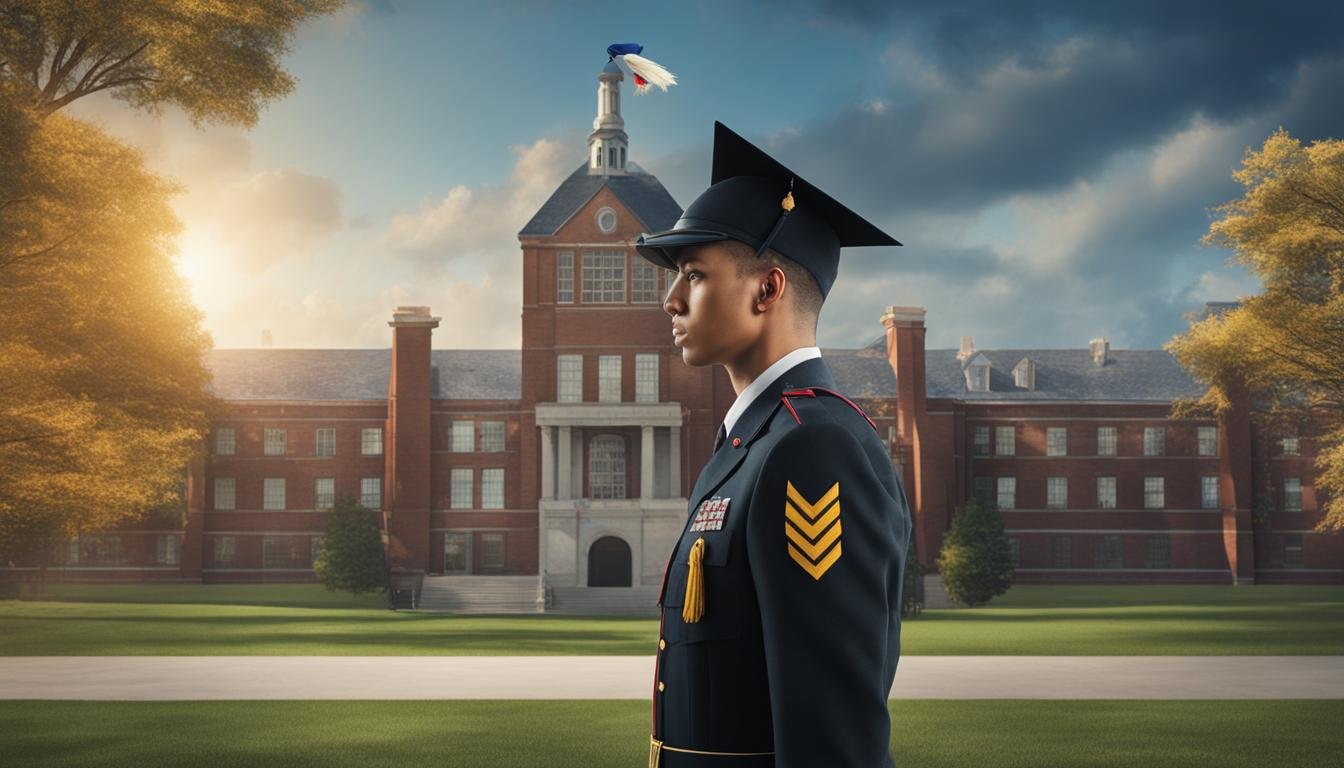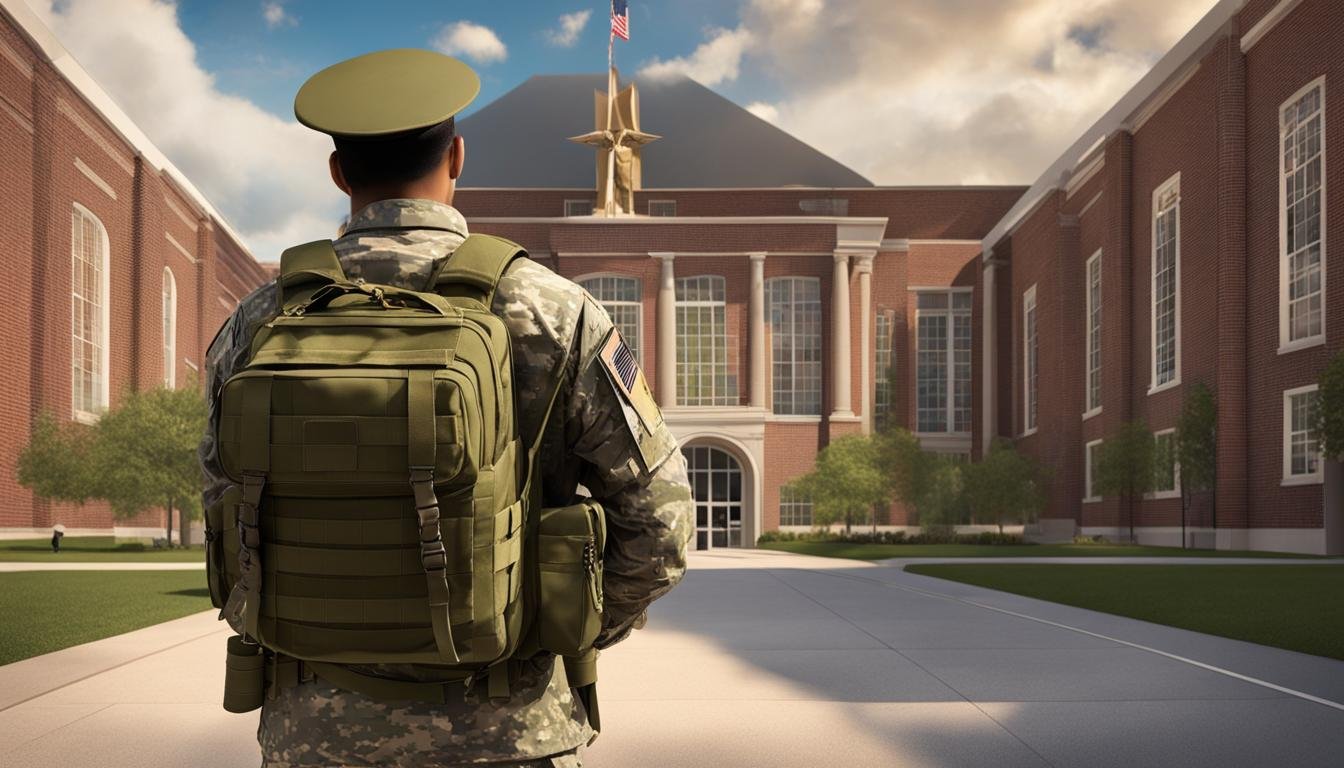The transition from military service to college can be challenging, but with the expanded opportunities provided by the Post-9/11 GI Bill® and Forever GI Bill®, more than 1.7 million military veterans can access college education. To make a successful transition, it is important to understand the benefits available under the GI Bill® and choose a school that matches your needs and interests. Seek support from colleges, veteran’s groups, and student-run organizations, who offer academic counseling, financial aid, and mental health resources. Overcome the stigma surrounding seeking support as many veterans struggle with post-service acclimation challenges. Find proper support services for academic, medical, mental health, and substance abuse concerns. Utilize resources like Real Warriors, Student Veterans of America, and the Veterans Crisis Line for assistance.
Key Takeaways
- Military to college transition programs provide expanded opportunities for veterans to access college education.
- Understand the benefits available under the GI Bill® and choose a school that suits your needs and interests.
- Seek support from colleges, veteran’s groups, and student-run organizations for academic, financial, and mental health resources.
- Overcome the stigma surrounding seeking support and utilize resources available for various concerns.
- Utilize resources like Real Warriors, Student Veterans of America, and the Veterans Crisis Line for assistance.
Finding Academic Support for a Smooth Transition

Transitioning from military service to college life can be challenging, especially when it comes to adapting to new learning and instruction strategies. However, there are several programs and resources available to help veterans prepare for and succeed in their studies. By utilizing these academic support services, you can ensure a smooth transition and make the most of your college experience.
The Warrior-Scholar Project
One program that veterans can turn to for academic support is the Warrior-Scholar Project. This initiative offers immersive workshops designed to harness the unique skills and qualities developed through military service, such as leadership, adaptability, and problem-solving abilities, and apply them to the academic setting. By participating in these workshops, veterans can develop a strong foundation for success in their college studies.
National Association of Veterans Upward Bound
Another valuable resource is the National Association of Veterans Upward Bound. This organization helps veterans identify their educational pursuits and provides instruction, enrichment, and support activities to help them excel academically. By participating in Upward Bound programs, veterans can receive guidance and assistance tailored to their individual needs, ensuring a successful transition from the military to college life.
Academic Counseling and Study Groups
Colleges and universities also offer on-campus resources to support veterans in their academic endeavors. Academic counselors are available to provide guidance and support throughout your college journey. They can help you navigate the transition, choose the right courses, and develop effective study strategies. Additionally, joining study groups can provide a sense of community and peer support, helping you tackle challenging coursework and improve your academic performance.
By taking advantage of programs like the Warrior-Scholar Project and the National Association of Veterans Upward Bound, as well as seeking support from academic counselors and engaging in study groups, veterans can find the academic support they need for a successful transition to college life.
The Importance of Mental Health Support in Transition

Transitioning from the military to college life can pose mental health challenges for veterans. Research shows that veterans face higher risks of depression, substance abuse, and PTSD compared to their civilian peers. It is crucial to explore and utilize the mental health services provided by your college.
Seek support from campus resources, such as counseling services, and take advantage of resources available through the Department of Veterans Affairs. The Veterans Crisis Line is also available 24/7 for immediate support. Prioritize mental health and seek assistance when needed.
Recognizing the unique struggles that veterans may face during their transition to college, many institutions offer specialized mental health support programs. These programs often provide tailored counseling services, peer support groups, and resources specifically designed to address the mental health needs of veterans.
By seeking help and utilizing the available resources, veterans can enhance their well-being and ensure a successful transition to college life. Prioritizing mental health support is essential for maintaining a positive academic experience and overall well-being during this significant life change.
How Can Military Leave Programs Help with a Smooth Transition to College?
Military leave for education programs can greatly assist service members in transitioning to college. These programs provide the flexibility and support necessary for veterans to navigate the challenges of higher education while balancing their military obligations. By offering financial aid and academic assistance, military leave programs ensure a smoother transition for veterans.
Conclusion
Transitioning from the military to college can be challenging, but with the right support and resources, you can have a successful academic turnaround. Take advantage of the military to college transition programs available, such as the expanded opportunities provided by the GI Bill®, to help fund your education. It is important to choose a school that aligns with your needs and interests.
Overcoming the stigma surrounding seeking support is essential. Remember, seeking help is not a sign of weakness. There are numerous resources available to support veterans during their transition to college. Reach out to colleges, veteran’s groups, and student-run organizations for academic counseling, financial aid, and mental health resources. These support services can assist you with academic, medical, mental health, and substance abuse concerns.
Make use of programs like the Warrior-Scholar Project and the National Association of Veterans Upward Bound to find academic support. These programs can help you navigate the learning and instruction strategies in college. Additionally, prioritize your mental health by utilizing the mental health services provided by your college and the Department of Veterans Affairs. Remember, you have what it takes to succeed, and with the right support, you can make a smooth and successful transition to college life.



